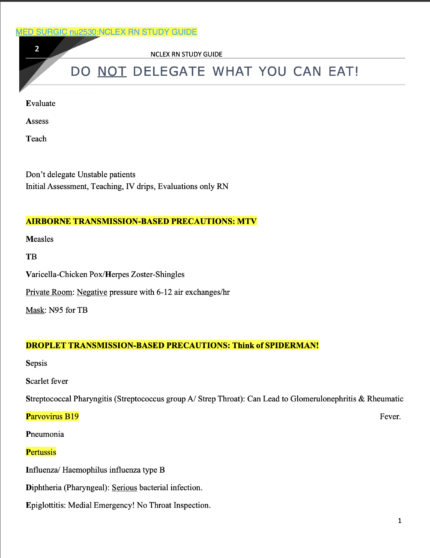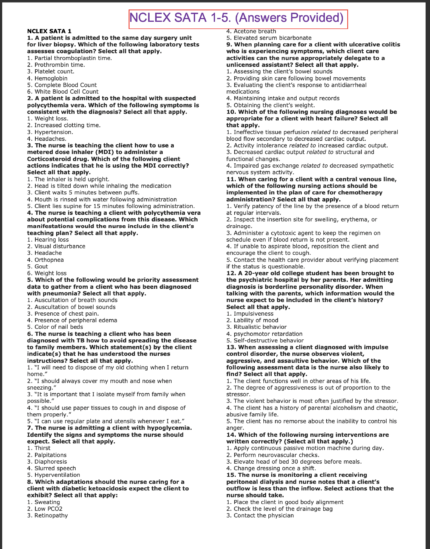NCLEX RN Test Bank 2011 Questions And Answers ( All Answers Correct)
NCLEX/RN
Is a process of learning a different culture to adapt to a new or changing environment.
(Answer) – Acculturation.
It is a subjective perspective of the person’s heritage and a sense of belonging to a group
(Answer) – Ethnic identity
Include meditation, relaxation techniques, imagery, music therapy, massage, touch, laughter, humor, & spiritual measures (prayer).
(Answer) – Low-risk therapies:
Because of their health & dietary practices, Native Americans, Latino Americans, Hispanic Americans, & African Americans.
(Answer) – High risk of obesity & diabetes mellitus
Surgery is not prohibited, but the administration of blood and blood products is forbidden. This religious group believes the soul cannot live after death. Administration of medication is an acceptable practice except if the medication is derived from blood products.
(Answer) – Jehovah’s Witnesses
Believers adhere to dietary kosher laws. In this religion, the dairy-meat combination is unacceptable. Only fish that have scales and fins are allowed; meats that are allowed include animals that are vegetable eaters, cloven-hoofed, and ritually slaughtered.
(Answer) – Orthodox Judaism
include whole medical systems, mind-body medicine, biologically based practices, manipulative & body-based practices, & energy medicine.
(Answer) – Five categories of complementary and alternative medicine (CAM):
Focused, maintains strong control, makes decisions, & addresses all problems. Dominates group & commands, rather than seeks suggestions or input. The manager addresses problem (quality improvement) with staff, designs a plan without input, & wants all problems reported directly back to her
(Answer) – Autocratic leader
Participative & would likely meet with each staff person individually to determine staff member’s perception of the problem. Would also speak with the staff about any issues & ask the staff for input in developing a plan.
(Answer) – Democratic leader
Passive and non-directive. Would state what the problem was & inform staff that the staff needed to come up with a plan to “fix it.”(Answer) – Laissez-faire leader
Assessment findings include cough, dyspnea, crackles, tachypnea, tachycardia, elevated blood pressure, bounding pulse, elevated CVP, weight gain, edema, neck & hand vein distention, altered LOC, & decreased hematocrit.(
Avocado, bananas, cantaloupe, carrots, fish, mushrooms, oranges, potatoes, pork, beef, veal, raisins, spinach, strawberries, & tomatoes
(Answer) – Common food sources of potassium:
Muscle weakness increased urinary output, & decreased specific gravity of the urine would be noted
(Answer) – Hyponatremia
Causative factors relate to malnutrition or starvation & the use of aluminum hydroxide-based or magnesium-based antacids. Malnutrition is associated with alcoholism. (Answer) – Hypophosphatemia
Renal insufficiency, hypoparathyroidism, & tumor lysis syndrome; causative factors. Should avoid foods high in phosphates; fish, eggs, milk products, vegetables, whole grains, & carbonated beverages. (Answer) – Hyperphosphatemia
Vomiting, diarrhea, conditions that increased respiration or increased urinary output, insufficient intravenous fluid replacement, draining fistulas, presence of ileostomy or colostomy. Diuretics, & gastrointestinal suctioning.(Answer) – Causes of a fluid volume deficit
Decreased kidney function, heart failure, hypotonic fluids to replace isotonic fluid losses, excessive irrigation of wounds & body cavities, & excessive ingestion of sodium. (Answer) – Causes of overhydration or fluid overload:
Trauma, burns, sepsis, or metabolic or respiratory acidosis. (Answer) – Hyperkalemia causes:
Answer) –
Overhydration or fluid overload & occurs when fluid intake or fluid retention
Cushing’s syndrome or colitis & over use of laxatives.(Answer) – Hypokalemia causes:
Decreased pH & decreased HCO3. Occurs in kidney disease; diabetic ketoacidosis; high-fat diet; insufficient metabolism of carbohydrates; malnutrition; ingestion of toxins, such as acetylsalicylic acid (aspirin); malnutrition; severe diarrhea. Intestinal secretion is high in bicarbonate & may be lost through enteric drainage tubes, an ileostomy, or diarrhea. (Answer) – Metabolic acidotic
Nausea & vomiting. Loss of gastric acid, causes pH & HCO3 to increase. Symptoms experienced would include hypoventilation & tachycardia. (Answer) – Metabolic alkalosis
Decreased pH and increased CO2. Hypoventalation & COPD (Answer) – Respiratory acidotic











